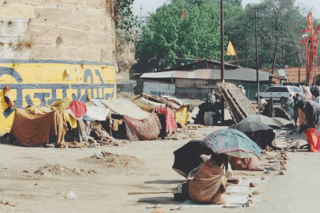“When I was young, growing up in India, I saw poverty and inequality everywhere,” recalls Niloufer Sohrabji, Professor and Program Director for Economics and Director of General Education. “In Bombay, there were extremely wealthy people in high-rise buildings near slums. As a young person, it distressed me.”
When Sohrabji learned about economics, she found a way to make sense of the disparities she saw and to devise potential ways to change them. “In college, economics gave me a way of thinking about these inequities, and taught me the kind of policies that could help alleviate poverty and inequality, and the things that could exacerbate these issues. It gave me a way to think about how to do something about it, which I found very empowering. I’ve never stopped loving it.”
Since then, Sohrabji has made a career of teaching economics and researching the globalization of emerging markets in countries such as India, Turkey, Ghana, and other countries in sub-Saharan Africa, as well as the impact of trade, foreign investment, and exchange rates. She teaches courses in macroeconomics, international trade and monetary systems, and econometrics. The last she describes as “the application of statistics to economic problems.”
Econometrics in Quantitative Research
Students in Sohrabji’s econometrics class learn how to conduct quantitative research on independently designed projects. In this way, her students begin to frame the driving forces behind poverty and inequality. She encourages students to reflect on issues they really care about, whether it’s the development of their country of origin or local transportation, and to look at it from different perspectives. She teaches regression analysis, a set of statistical methods used to estimate relationships between dependent and independent variables.
“Their project doesn’t have to be related to economics, or to their majors. They can apply it to anything they are interested in studying,” says Sohrabji. “One student applied these tools to analyze comic book sales.” That student contacted comic book store owners and requested general sales data to use in her project, and was lucky to get the data she requested. “I always tell students, if you know someone who may be able to provide data, write to them. Tell them what you are working on and how you will use the information, and that you will send them the paper when it’s done.”
Students in her course learn to write in an academic format, much like the literature they read. “I love teaching that class,” says Sohrabji. “It’s empowering for students to have a deliverable when they are done: they found the data, struggled with the model, and did the work. And I get to engage with students on research that excites them.”
How International Economics Impacts Our Daily Lives
In her International Economics course, Sohrabji begins the semester with a simple assignment. “I ask my students to track the things they use in their daily lives, like food and clothing. I ask them to think about where these items come from, where they are made. My goal is to get students to think about how reliant we are on other countries for the things that we take for granted in our daily lives.”
As an example of this, she cites Boston’s MBTA system, which may use train parts made by foreign companies. “When we have economic trade policies, or tariffs with other countries, all of that can impact us,” she says. “It could impact the cost to ride the T. It could also impact the quality of the parts used, and the risk of breakdown.”
In this class, students use case study analysis to understand the changes taking place in other countries, the challenges and benefits, and how these changes may apply to our lives in the United States. “A couple of years ago, a student did a project to understand how Brazil was trying to achieve environmental sustainability through their transportation system,” says Sohrabji. “She studied the investments they made, what worked, and what didn’t. The work they were doing in Brazil could be quite valuable for other countries to understand. If other countries have taken the lead on global challenges, then we should look to them.”
Researching Impacts of COVID-19 and Trade Agreements
Currently, Sohrabji is working on a few research projects. In one she seeks to understand the impact of COVID-19 on career aspirations. “There are a lot of studies on the impact of careers, but this is on how you are thinking about your career,” she notes. “We created and administered a survey … and gathered some interesting data.”
Another project, “The Potential Benefits of an India-US Free Trade Agreement,” focuses on modeling what could happen if there was a trade agreement between India and the U.S., resulting in a reduction in trade restrictions. “It’s related to a topic that I have researched throughout my professional life: globalization and economic development,” she says. For this project, Sohrabji was able to hire students as research assistants through the Faculty-Student Collaborative Fellowship. “Each one of them has contributed to the project, helping me think differently about it,” she says. “I’m grateful that I get to work with Simmons students and benefit from their creative thinking and their research assistance.”
Sohrabji is eager to involve students in her research projects and to guide them on their own intellectual endeavors. She considers economics a “foundational discipline” that naturally overlaps with most other majors, and it can offer an important perspective on understanding the world and the choices we make.

